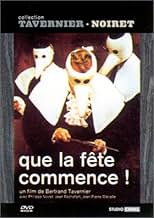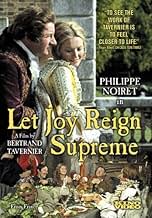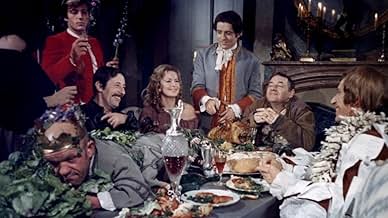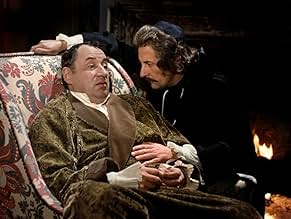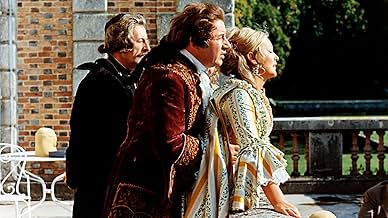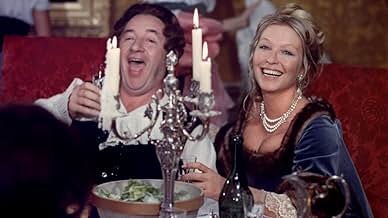Que la fête commence...
- 1975
- Tous publics
- 1h 59m
IMDb RATING
7.0/10
1.9K
YOUR RATING
A look at 18th-century France, when the authorities' depravity contribute to social oppression, and the uprisings flare up one after another.A look at 18th-century France, when the authorities' depravity contribute to social oppression, and the uprisings flare up one after another.A look at 18th-century France, when the authorities' depravity contribute to social oppression, and the uprisings flare up one after another.
- Director
- Writers
- Stars
- Awards
- 5 wins & 3 nominations total
- Director
- Writers
- All cast & crew
- Production, box office & more at IMDbPro
Featured reviews
well, the film directed by auteur Bertrand Tavernier did win 3 awards at cesar, Tavernier who a former assistant to french crime master Jean Pierre Melville who died 2 years before the cesar award came out(1975)(so obviously unable to make his name into the cesar history) now could be touched in his grave since his prestigious student did it for him or in his name
well, the man who directed this decent film----Bertrand Tavernier, suddenly became a director after his master's death in 1973 and who I admit is a good director all the way , deserves his wins , but that doesn't mean the film is superior to those films made before 1975 when there were no awards to honor them. after all from today's point of view, 1975 is sorta the weakest year in all time french cinema, so we hope if cesar could have been launched much earlier than 1975
I also noticed that some people,Michel Blanc ,Christian Clavier,Thierry Lhermitte,Gérard Jugnot who later became very famous here were all under the direction of tavernier who i actually didn't consider a star maker at all before this time
could have won more cesars if Tavernier was a better student
well, the man who directed this decent film----Bertrand Tavernier, suddenly became a director after his master's death in 1973 and who I admit is a good director all the way , deserves his wins , but that doesn't mean the film is superior to those films made before 1975 when there were no awards to honor them. after all from today's point of view, 1975 is sorta the weakest year in all time french cinema, so we hope if cesar could have been launched much earlier than 1975
I also noticed that some people,Michel Blanc ,Christian Clavier,Thierry Lhermitte,Gérard Jugnot who later became very famous here were all under the direction of tavernier who i actually didn't consider a star maker at all before this time
could have won more cesars if Tavernier was a better student
10kalala
This is a film that has haunted me for thirty years. I just re-viewed it on DVD and it was every bit as good as I remembered. I don't know why it doesn't show up in festivals and best-of-all-times list; it is on mine. It is satisfyingly densely textured and the acting is flawless. It is rich in every way-- historically fascinating as it shows the tugging at the fibers of France that would eventually (but not quite yet) culminate in revolution, the many nuances of class resentment from the top down -- tension between royalty and nobility, generals and (would-be) clergy, and provincial gentry and their peasantry.
Luxurious scenes and costumes and cinematography. Psychologically rich, terrific dialog, in the closely twined relationship between jaded nobility and ambitious bourgeois that plays out in a tug-of-war over the fate of Bretons. Philippe Noiret as the jaded regent is the ambiguous moral center, stoic yet decadent, embodying la patrie yet carving a private erotic niche apart from a world where his decision can tip the balance of European powers.
Luxurious scenes and costumes and cinematography. Psychologically rich, terrific dialog, in the closely twined relationship between jaded nobility and ambitious bourgeois that plays out in a tug-of-war over the fate of Bretons. Philippe Noiret as the jaded regent is the ambiguous moral center, stoic yet decadent, embodying la patrie yet carving a private erotic niche apart from a world where his decision can tip the balance of European powers.
This movie tackles heads-on a very interesting period in French history, when the nephew of Louis XIV , Philippe d'Orleans, was made regent for 10 years while Louis XV, a 5-year old child, waited for his majority. Its strength: the angle chosen by the scriptwriters, who encapsulate in 90 mn a sharp evaluation of the character of the Regent in the context of the era he lived in. The director makes the choice to shows us a man eager and able to do good for the country, while jaded in every other part of his life. The story is cynical and bawdy, but there is great wit in the dialogs, and very sharp moments of political observations relevant to the period (as well as to our modern period, frankly). We see the Powerful, the Entitled, the greedy, the ambitious and the scruple-free, and we occasionally glimpse at the rest: the Poor, brutalized and hopeless. I liked how the figure of Philippe d'Orleans, a libertine and miscreant who notoriously managed to govern France wisely against all odds, is humanized here by his keen intelligence of the facts around him, and how he grabs the viewers' empathy thanks to his self-awareness -and inherent compassion-while steeped in widespread decay. Whether, as a ruler, he deepened that general decay with his own turpitudes, or whether despair in front of its extent prevented him from fighting it is the question the film poses.
Unfortunately, this sharp attention to the character of Philippe is not given to the rest of the production. There is a feel of 'made for TV" movie about both the production and the casting. The main parts (Rochefort, Marielle and Noiret, Vlady) are wonderfully acted and utterly believable; but the rest of the cast feels like a bunch of extras hired on the run, thrown a costume and told to look and act "peasant", "soldier", "nun", "nude prostitute", "blind musician". I noted for instance that all the "starving" peasants look in fact well fed, and that the château's staff is forever statically sweeping the floor or pouring liquids in glasses. It seems no one cared to give them real directions, and that flaw distracted my attention too often. As a historical or political pamphlet, Let Joy Reign Supreme is truly a compelling movie to watch. But as a work of art, it left me wanting.
Unfortunately, this sharp attention to the character of Philippe is not given to the rest of the production. There is a feel of 'made for TV" movie about both the production and the casting. The main parts (Rochefort, Marielle and Noiret, Vlady) are wonderfully acted and utterly believable; but the rest of the cast feels like a bunch of extras hired on the run, thrown a costume and told to look and act "peasant", "soldier", "nun", "nude prostitute", "blind musician". I noted for instance that all the "starving" peasants look in fact well fed, and that the château's staff is forever statically sweeping the floor or pouring liquids in glasses. It seems no one cared to give them real directions, and that flaw distracted my attention too often. As a historical or political pamphlet, Let Joy Reign Supreme is truly a compelling movie to watch. But as a work of art, it left me wanting.
This banquet, unlike one of foodstuffs, can be savored again and again to discover its parts. A political tale, a moral tale, an aesthetic breadth that rewards repeated viewing. The casual brutality of the palace: children playing darts against a painting; nobles and servants tossing around a dead rat; and, of course, the walking latrine! As above, so below: brutish soldiers, "shanghai-ers" for the colonies, provincial nobles who live in squalid houses barely above hovels. Noiret, Rochefort, Marielle so perfectly embody their characters; wise yet inconstant Orleans, conscienceless striver Dubois, impetuous, foolish yet gentlemanly Pontcallac. It would be rewarding to view this en suite with Etore Scola's brilliant "La Nuit de Varennes" to bracket the themes.
This majestic movie reveals everything of that contrasting period after the reign of the "Roi Soleil". France was empty-blooded by the wars and de best thing the Régent of that moment could was to make peace with England. A Breton upraising supported by Spain was the worst case scenario. L'abbé Dubois is eager to become archbishop and everything he does, even the national politics is supported by his dream. We see the speculations about Missisipi and the first bank notes by the state. The Régent, Philippe Noiret, is a person who enjoys life and tries to avoid all problems. Against this, l'abbé Dubois and the nephew of the Régent seem to be the human beasts fueled by their ambition. The church is all powerful and the High Nobility without scruples. The state tries to populate la Louisiane by embarking prostitutes. The Régent seem to be the only good person of his time. This movie is a joy to watch again because of the sharp dialogue and the historical details.
Did you know
- TriviaAgnès Château's debut.
- ConnectionsReferenced in Des Bronzés au Père Noël, la folle histoire du Splendid (2014)
- SoundtracksGénérique: Forlane / Penthée Acte V)
Composed by Philippe d'Orléans
- How long is Let Joy Reign Supreme?Powered by Alexa
Details
- Runtime
- 1h 59m(119 min)
- Sound mix
- Aspect ratio
- 1.85 : 1
Contribute to this page
Suggest an edit or add missing content

![Bande-annonce [OV]](https://m.media-amazon.com/images/M/MV5BYzg1NDE4N2EtN2FiMi00MmEwLTkwM2UtMDNkMDA5Y2ZmODE5XkEyXkFqcGdeQXRyYW5zY29kZS13b3JrZmxvdw@@._V1_QL75_UY281_CR0)
